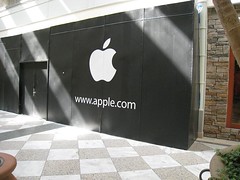It occurs to me that I've been a bad journalist today, and I haven't really explained just why Apple's iPhone SDK is such a big deal; I certainly didn't go as nuts about the Android SDK and spend the entire day writing about it, but it's because the iPhone SDK changes things in a big way when it comes to mobile.
First of all, the iTunes App Store. It functions the same as iTunes, making software downloading and installation a snap. Have you ever tried to install a program on your cellphone? On my previous phones, it was near impossible. Things have gotten better with the inclusion of mini-USB ports so that cellphones can be hooked up to computers, but the process isn't an easy one. For the average consumer, or even a more tech-savvy one, mobile program installation is hard. A couple touches at the App Store, and it's done.
For the developer, things are also complicated -- there are multiple approaches to distributing their software. The first and most profitable means is to get their program bundled with the handset. Developers could also negotiate with the cellphone carrier to have their program on the carrier's website to download. Another method would entail setting up a website from which they can take payments and then send the program to the customer's cellphone. Of course, before any of this can happen, the program must be written and compiled for the proper handset. Apple's App Store simplifies this process greatly -- no need to worry about compatibility, because there's only one iPhone -- installation of the program is a snap for users, Apple sets up the website, so the program is on a central location, Apple splits the revenue with the developer if there's money involved, freeware doesn't cost anything. Most developers are going to be happy with the 70/30 split -- the distribution of software alone is going to be worth it.
The new App Store simplifies it both on the consumer end, and the developer end.
Although the business applications of the iPhone were certainly not nearly as glamorous as their gaming cousins, Enterprise software is a big segment of the smartphone market, and Apple is very smart to embrace their needs as well. One of the things that Apple is going to do for the Enterprise is to set up a App mini-Store just for that business, and that's certainly going to change how things get done.
For instance, an e-mail can just be sent notifying the employees to update their iPhones with the latest version of whatever proprietary iPhone app they're running, and with a couple of touches, they're finished.
Today, Fake Steve Jobs wrote:
What Fake Steve is saying is that it's 'game over' for the other smartphones -- the iPhone platform has the infrastructure and support structure that's been largely missing from the other mobile manufacturers, and it's a difference that consumers, businesses and developers are going to see and experience. If these other handset makers want to survive, they've got to follow Apple's lead.

